The 52nd Session of the Human Rights Council
27 February – 4 April 2023
Item 3 – Interactive Dialogue on High Commissioner's oral update on Sudan
3rd March 2023
By Natalia Venegas / GICJ
Executive Summary
On the 3rd of March 2022, at the 52nd session of the Human Rights Council, an interactive Dialogue took place on the High Commissioner's updated report on Sudan.
The High Commissioner on Human Rights pointed out that signing the agreement on the 5th of December 2022 was the first act of restoring civilian rule and the transition to democracy for Sudan. He also showed concern over using emergency legislation in violation of human rights.
The High Commissioner travelled to Sudan last November for his first country visit as High Commissioner. He witnessed a country at a critical juncture. There was pain born from decades of conflict, but there was also hope for change. The signing of the political framework agreement on the 5th of December 2022 was an important step towards the restoration of civilian rule and the transition to democracy.
The High Commissioner pointed out that people in Sudan look forward to safely returning to their lands. He also pointed out that women have been at the front of peaceful protest and civil society action during the transitional government. Moreover, they have been victims of hate speech and harassment both online and offline. The High Commissioner also noted that the cost of essential services, food and fuel has increased. In addition, the population is under enormous pressure because of the increased imposition of taxes and fees, including school fees.
The signing of the political framework agreement on the 5th of December 2022 was also a first, important step towards the restoration of civilian rule and the transition to democracy. Mr Türk urged that solid commitments to human rights and justice be enshrined in the final agreement. All those responsible for human rights violations and abuses must be held accountable. A review of emergency legislation was needed to ensure that any amendments were entirely in line with international human rights law.
The representative of Sudan highlighted that women's rights have always been a priority for the country and that the constitutional document has provided positive discrimination for women. They have been given 40% of the seats in the registrative Council to guarantee their representation. They have also been working to access the CEDAW and implement Security Council resolution 1325 on women, peace and security. Sudan called on the Human Rights Council to reconsider the diversity of mechanisms in the country - multiplicity led to duplication of efforts and overlap of jurisdiction. Sudan would continue to work as part of this Council to achieve the purposes for which it had been established.
Geneva International Centre for Justice (GICJ) urges the Sudanese government to continue implementing and guaranteeing women's rights as critical players in the democratic process. Furthermore, to maintain the well-being of its citizens, Sudan must guarantee security to allow them to return to their lands safely, as well as access to education, food, and essential goods.
Background
Given the political background, the Sudanese military launched a military coup on October 25th, 2021, under the leadership of Lieutenant General Abdul Fattah Burhan, Chairman of the Sudanese Sovereignty Council and Commander of the Sudanese Armed Forces. In a televised address, he declared a state of emergency, suspended Articles 11, 12, 15, 16, 24(3), 71 and 72 of the constitutional document, and dissolved the Sovereign Council and the Council of Ministers. He justified the coup as a step to "correct" the revolutionary path promising to hold elections by July 2023. He pledged that the military would support the Sudanese people's call for civilian rule and abide by constitutional documents and the Juba peace agreement. Declaring a state of emergency does not meet the international notification requirements in Article 4, paragraph 3 of the International Convention. The coup sparked protests, strikes and a civil disobedience movement and was widely condemned by the UN secretary-general and the UN High Commissioner for Human Rights. On October 26th 2021, the African Union Peace and Security Council suspended Sudan's participation in all African Union activities until a civilian-led transitional government was restored.
The report of the United Nations High Commissioner for Human Rights on Sudan at the fiftieth session of the Human Rights Council noted that the Human Rights Council, in its resolution S-32/1, called on the United Nations High Commissioner for Human Rights to appoint a human rights expert for Sudan. She also called on the High Commissioner, with the support of the experts-designate, to submit a comprehensive report to the Council at its fiftieth session, focusing on the human rights situation and violations and abuses since the military era. On November 12 2021, the High Commissioner appointed Adama Dieng as an expert on human rights in Sudan. Covering the period October 25th 2021, to April 10th 2022, the report is based on information and observations gathered by experts with the support and cooperation of the United Nations Joint Human Rights Office in Sudan, including through consultations with all relevant parties, including civil society. The report outlines Sudan's leading human rights challenges since the military took power and recommends how to address them.
Report of the High Commissioner on the Human Rights Situation in Sudan
Volker Türk, United Nations High Commissioner for Human Rights, said he had travelled to Sudan last November for his first country visit as High Commissioner and had witnessed a country at a critical juncture. There was pain born from decades of conflict, but there was also hope for change. The signing of the political framework agreement on the 5th of December 2022 was also a first, important step towards the restoration of civilian rule and the transition to democracy. Mr Türk urged that solid commitments to human rights and justice be enshrined in the final agreement. All those responsible for human rights violations and abuses must be held accountable. A review of emergency legislation is needed to ensure that any amendments align with international human rights law.
He also highlighted the cooperation of the government of Sudan with the office. However, he expressed that later in the week, a 17-year-old boy was shot dead by a police officer in Khartoum. The immediate action taken by the authorities was to investigate this killing and to arrest the officer responsible, an important step. According to medical authorities, this person was the 125 person to die since the protest began 16 months ago.
Impunity continues to be a severe issue. Victims see simple accountability and transitional justice measures as a priority and precondition for stability and democratic transformation. Also, Mr Türk welcomed the release of political prisoners and 300 men detained by government orders under emergency legislation. In Darfur, he said he saw the effects of the delays on the implementation of the peace agreements and the national plan for the protection of civilians. In addition, many displaced people have been away from their lands for nearly 20 years. Regardless, he has hope that they will be able to return one day.
The High Commissioner pointed out that women have been at the front of peaceful protest and civil society action during the transitional government. Moreover, they have been victims of hate speech and harassment both online and offline. The High Commissioner also noted that the cost of essential services, food and fuel has increased. The population is under enormous pressure because of the increased imposition of taxes and fees, including school fees. He also stated that everyone has the right to peaceful assembly and protest. Furthermore, the state must ensure that the rights of all Sudanese are respected in that regard.
Lastly, he pointed out that the people still carry the roots of the 30-year dictatorship and that the transitional justice process and implementation of the peace treaty should be in a victim state approach to prevent this from happening again to the country, especially to the people.
Interactive Dialogue
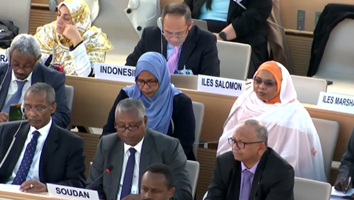 The representative of Sudan, said the Prosecutor General had formed several commissions for criminal investigations in all forms of violations of human rights and violence against women. Sudan stressed its commitment to the principle of non-impunity. Committees of reconciliation and reparation for same-tribe strife in some provinces had been established. Sudan had made strides in the implementation of the deployment of joint forces in the framework of the National Civilian Protection Mechanism and in line with the Juba peace deal. Since last May, the state of emergency has been lifted, and detainees have been released. Sudan called on the Human Rights Council to reconsider the diversity of mechanisms in the country - multiplicity led to duplication of efforts and overlap of jurisdiction. Sudan would continue to work as part of this Council to achieve the purposes for which it had been established.
The representative of Sudan, said the Prosecutor General had formed several commissions for criminal investigations in all forms of violations of human rights and violence against women. Sudan stressed its commitment to the principle of non-impunity. Committees of reconciliation and reparation for same-tribe strife in some provinces had been established. Sudan had made strides in the implementation of the deployment of joint forces in the framework of the National Civilian Protection Mechanism and in line with the Juba peace deal. Since last May, the state of emergency has been lifted, and detainees have been released. Sudan called on the Human Rights Council to reconsider the diversity of mechanisms in the country - multiplicity led to duplication of efforts and overlap of jurisdiction. Sudan would continue to work as part of this Council to achieve the purposes for which it had been established.
The representative also pointed out that women's rights have always been a priority for the country. The constitutional document has provided for positive discrimination against women. Women have been given 40% of the seats of the Legislative Council to guarantee their fair representation and the sovereignty council and the Council of Ministers. They are also working to accede to CEDAW and to implement the Security Council resolution 13/25 on women, peace and security. This is part of the national plan for 2022-2023.
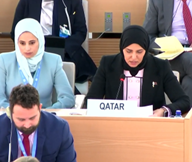 The representative of Qatar noted that the signing of the framework agreement represents the need to facilitate transitional justice and put the country on a successful transition. Also, they should strengthen their institutions to achieve the best process possible.
The representative of Qatar noted that the signing of the framework agreement represents the need to facilitate transitional justice and put the country on a successful transition. Also, they should strengthen their institutions to achieve the best process possible.
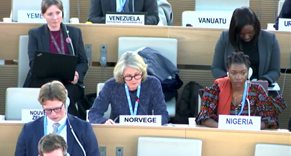 The delegation of Norway spoke on behalf of a group of the northern and Baltic countries. She said that the situation of human rights in Sudan remained a cause for serious concern. In recent months the country has seen clashes between armed groups and too many civilians remain exposed to violence. She called upon the signatories to implement the peace agreement and stated that the right to peaceful protest must be respected.
The delegation of Norway spoke on behalf of a group of the northern and Baltic countries. She said that the situation of human rights in Sudan remained a cause for serious concern. In recent months the country has seen clashes between armed groups and too many civilians remain exposed to violence. She called upon the signatories to implement the peace agreement and stated that the right to peaceful protest must be respected.
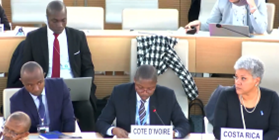 Côte d'Ivoire (on behalf of the African Group) highlighted Sudan's collaboration with the High Commissioner's office. The group is also awaiting with interest the implementation of the peace agreement. The group called on the international community to contribute to the success and transition of the government in Sudan.
Côte d'Ivoire (on behalf of the African Group) highlighted Sudan's collaboration with the High Commissioner's office. The group is also awaiting with interest the implementation of the peace agreement. The group called on the international community to contribute to the success and transition of the government in Sudan.
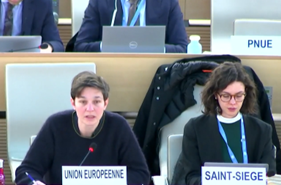 The European Union noted that partial progress had been achieved in implementing the 2018 Revitalised Peace Agreement. However, as planned elections have been postponed to late 2024, they remain worried about its slow implementation and call strongly for a peaceful and just transition. After nearly five years of delay, the opportunity must be seized to reset the country towards peace, the rule of law, democratic transition and prosperity. The EU and its Member States remain deeply concerned about the continuous violence, displacements and gross human rights violations and abuses, including sexual and gender-based violence, taking place in the country. In the past year, Sudan has documented widespread attacks against civilians in several states, including southern Unity State, Upper Nile State and northern parts of Jonglei State. These conflicts were left with minimal response from the Revitalised Transitional Government of National Unity (RTGNU), despite months of widespread attacks against the civilian population. We strongly support your request on any party to end attacks on civilians immediately and wish to recall in the strongest terms that the RTGNU is primarily responsible for protecting its population.
The European Union noted that partial progress had been achieved in implementing the 2018 Revitalised Peace Agreement. However, as planned elections have been postponed to late 2024, they remain worried about its slow implementation and call strongly for a peaceful and just transition. After nearly five years of delay, the opportunity must be seized to reset the country towards peace, the rule of law, democratic transition and prosperity. The EU and its Member States remain deeply concerned about the continuous violence, displacements and gross human rights violations and abuses, including sexual and gender-based violence, taking place in the country. In the past year, Sudan has documented widespread attacks against civilians in several states, including southern Unity State, Upper Nile State and northern parts of Jonglei State. These conflicts were left with minimal response from the Revitalised Transitional Government of National Unity (RTGNU), despite months of widespread attacks against the civilian population. We strongly support your request on any party to end attacks on civilians immediately and wish to recall in the strongest terms that the RTGNU is primarily responsible for protecting its population.
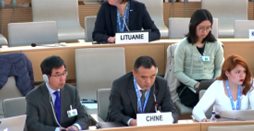 The delegate of China stated that Sudan has inflation problems and a lack of needs. China is concerned about some countries' unilateral coercive measures imposed on Sudan, which trouble the pursuit of Sudan for human rights. These measures stop social and economic development that should be the international community's focus towards Sudan.
The delegate of China stated that Sudan has inflation problems and a lack of needs. China is concerned about some countries' unilateral coercive measures imposed on Sudan, which trouble the pursuit of Sudan for human rights. These measures stop social and economic development that should be the international community's focus towards Sudan.
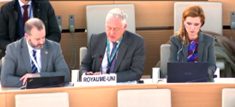 The representative of the United Kingdom welcomed the signing of the political framework agreement and considers that this is a huge part towards the step for Sudan's transition to a civilian-led government. Nevertheless, there is much more to be done in addressing the human rights situation regarding the protestant's life ammunition.
The representative of the United Kingdom welcomed the signing of the political framework agreement and considers that this is a huge part towards the step for Sudan's transition to a civilian-led government. Nevertheless, there is much more to be done in addressing the human rights situation regarding the protestant's life ammunition.
Some speakers said, among other things, that human rights violations and abuses were linked to the fragile political situation. Work to solve this should be based on the Framework Agreement, as this was the only way forward, leading to free and fair elections. The authorities had an obligation to respect, protect and fulfil the human rights of everyone in Sudan. Therefore all military and security forces must immediately stop violence against civilians and peaceful protestors and fulfil their obligations, which were none other than protecting the people in Sudan and providing stability and security, without which Sudan as a whole would not prosper.
Position of Geneva International Centre for Justice
Geneva International Centre for Justice (GICJ) welcomes the High Commissioner's report and its recommendations which call on the government of Sudan to respect the right to peaceful protest, women's rights and the rights of internally displaced people. Further, GICJ encourages ongoing initiatives to bring about durable political solutions in Sudan that promote the protection of human rights for all. GICJ condemns all human rights abuses perpetrated by the military and all other parties to the conflict in Sudan. Developing a robust political foundation based on fundamental human rights and implementing democratic processes are imperative for Sudan.
Sudan's Constitution is the cornerstone of democracy, and the government must uphold all rights set out in the Bill of Rights. GICJ also welcomes the participation that the government of Sudan has given women. Nevertheless, there is a lot more to be done regarding gender equality and stopping sexual and gender-based violence and enforced disappearances, patterns of arbitrary mass arrests of protestors, and excessive force used against protesters we express concern. We are concerned about the utter impunity for human rights violations. Therefore, we ask the Council to demand that the Sudanese government conduct timely, comprehensive, impartial, independent investigations and prosecute those who violate human rights.
Elections, Military Takeover, coup, Interactive dialogue, Sudan, Women, Girls, Women's rights, Economic Empowerment, Human Rights, Geneva, Justice, Geneva4Justice, GICJ, Geneva International Centre for Justice




